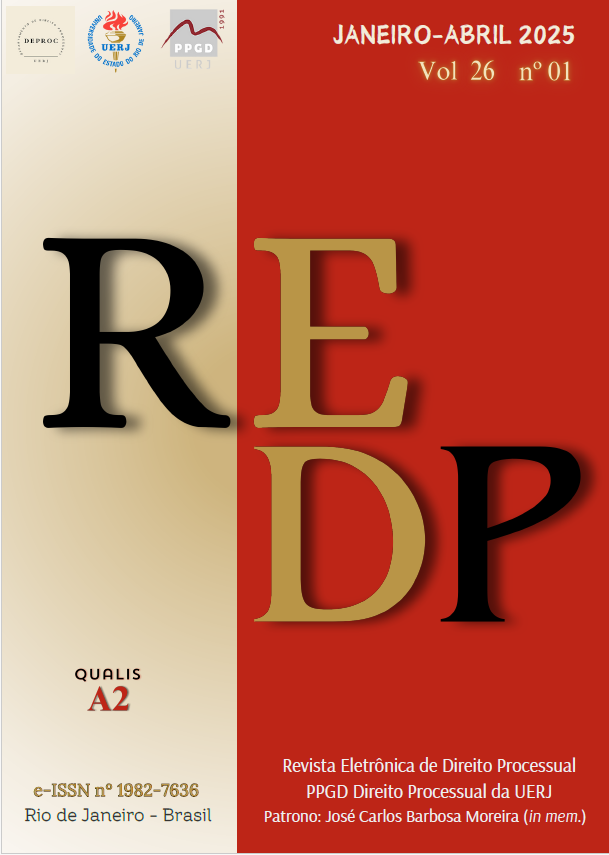ON TRANSINDIVIDUAL SUITS: FROM DERIVATIVE, THROUGH AGGREGATIVE, TO COLLECTIVE LITIGATION
DOI:
https://doi.org/10.12957/redp.2025.88851Resumo
O litígio transindividual revolucionou o direito moderno. Houve alteração profunda das reivindicações adjudicadas. Além do impacto a grande número de pessoas, essas ações operam de forma única. Possuem a particularidade de exigir a proteção constante dos interesses das partes representadas pelos legitimados. Não surpreendentemente, o direito empresarial tomou parte nesse fenômeno. Por exemplo, as ações derivativas permitem que indivíduos processem uma coletividade maior. Naturalmente, voltam-se para os intesses corporativos em vez de se voltar aos da sociedade como um todo. Do mesmo modo, acionistas têm implantado ações coletivas
regularmente. Assim, agregam, em grande parte, suas reivindicações contra a corporação e do conselho de diretores. O objetivo deste artigo é analisar (a) ações derivativas juntamente com (2) as ações coletivas de acionistas. Isso revelará divergência profunda sob uma semelhança superficial entre elas. Mais significativamente, os reclamantes visam à reivindicação de um direito genuinamente coletivo e indivisível nas primeiras. Eles se esforçam para a aplicação de uma agregação de direitos individuais. Consequentemente, esses mecanismos se contradizem no cerne. Eles diferem em vários aspectos cardeais: de seu modo representativo, para seu objetivo, através de sua construção interna de justiça, para sua perspectiva sobre representação adequada. A apreciação de sua oposição dicotômica pode contribuir para uma compreensão do funcionamento interno de cada um deles. Adicionalmente, irradia o relacionamento entre os participantes internos: da própria corporação, através da diretoria, e por meio dos investidores, além dos stakeholders. Ao compreender a dicotomia, ganham-se insights inestimáveis sobre direitos de grupo em geral. Além disso, uma nova interpretação do ponto-chave, onipresente nas situações concretas, entre as pretensões societárias (1) derivativas e as (2) diretas, torna-se necessária. Especificamente, exige seja considerada a natureza do direito em jogo.
Downloads
Publicado
Como Citar
Edição
Seção
Licença
Copyright (c) 2024 Ángel R. Oquendo

Este trabalho está licenciado sob uma licença Creative Commons Attribution 4.0 International License.
Todos os artigos publicados na Revista Eletrônica de Direito Processual (REDP) (Departamento de Direito Processual, Universidade do Estado do Rio de Janeiro, Brasil) são licenciados por meio de uma Licença Creative Commons - Atribuição 4.0 Internacional (CC BY 4.0).
Os autores retêm os direitos autorais de seu artigo e concordam em licenciar seu trabalho com a licença CC BY 4.0, aceitando assim os termos e condições específicos desta licença disponíveis no seguinte website: https://creativecommons.org/licenses/by/4.0/legalcode.
- Os autores concedem à REDP o direito de primeira publicação, de se identificar como publicadora original do trabalho e concedem à revista uma licença de direitos não exclusivos para utilizar o trabalho das seguintes formas: Reproduzir, vender e distribuir cópias eletrônicas ou impressas do manuscrito como um todo, de partes específicas do manuscrito e de suas traduções para qualquer idioma;
- O uso do artigo por terceiros é livre, contanto que a integridade da publicação seja mantida e seus autores originais, periódico de primeira publicação e detalhes de citação sejam identificados.
Dentro dos termos da licença, os autores podem entrar em acordos contratuais adicionais separados para a distribuição não exclusiva da versão publicada do trabalho na revista.
Copyright and Licensing
All articles published in the Procedural Law Electronic Review (REDP) (Department of Procedural Law, State University of Rio de Janeiro, Brazil) are licensed under a Creative Commons License - Attribution 4.0 International (CC BY 4.0).
- Authors retain copyright to their article and agree to license their work under the CC BY 4.0 license, thereby accepting the specific terms and conditions of this license available at the following website: https://creativecommons.org/licenses/by/4.0/ legal code.
- Authors grant REDP the right of first publication, to identify itself as the original publisher of the work, and grant the journal a non-exclusive license to use the work in the following ways: Reproduce, sell and distribute electronic or printed copies of the manuscript as a whole, of specific parts of the manuscript and its translations into any language;
- Use of the article by third parties is free, as long as the integrity of the publication is maintained and its original authors, first publication journal, and citation details are identified.
Within the terms of the license, authors may enter into separate additional contractual agreements for the non-exclusive distribution of the published version of the work in the journal.




